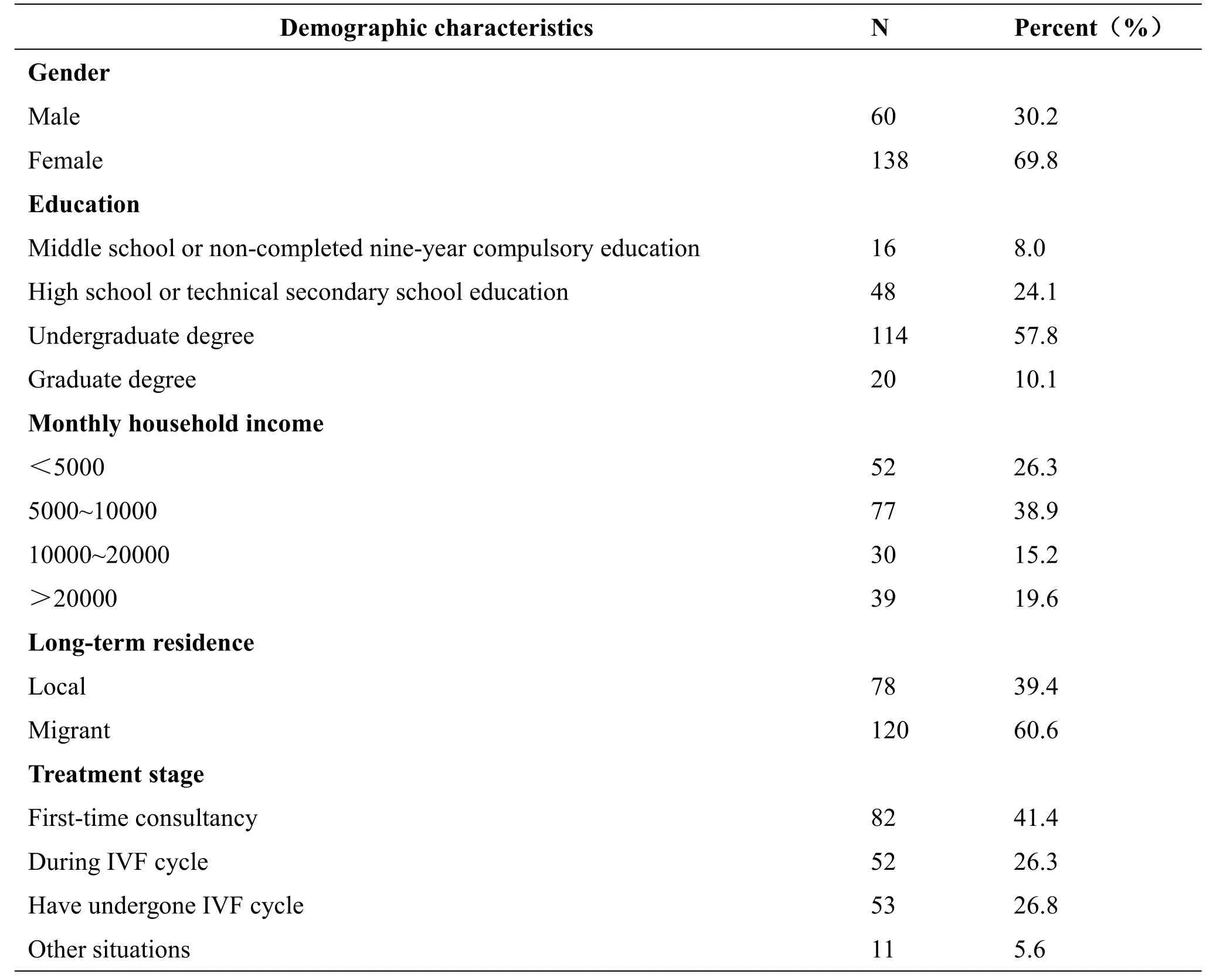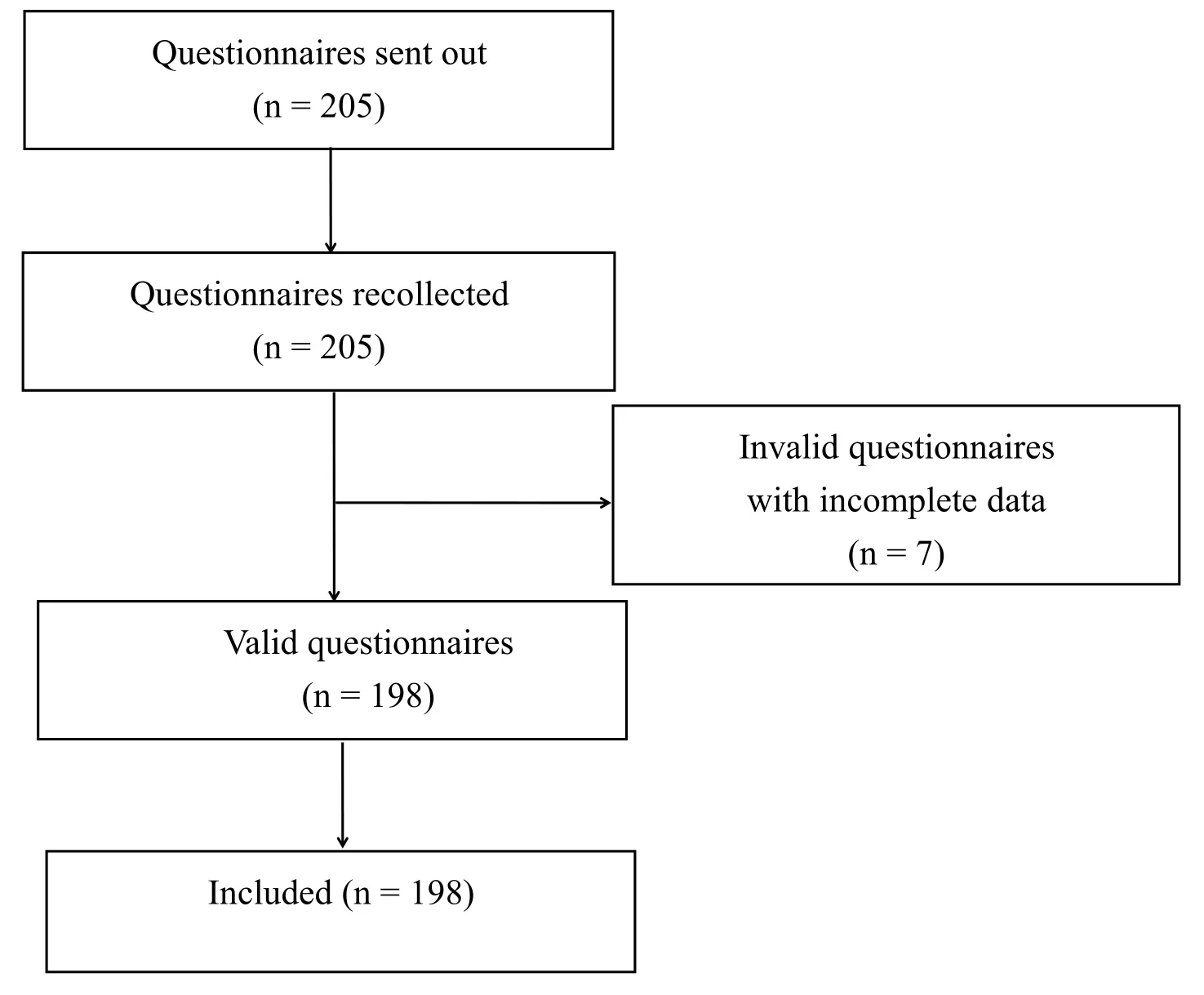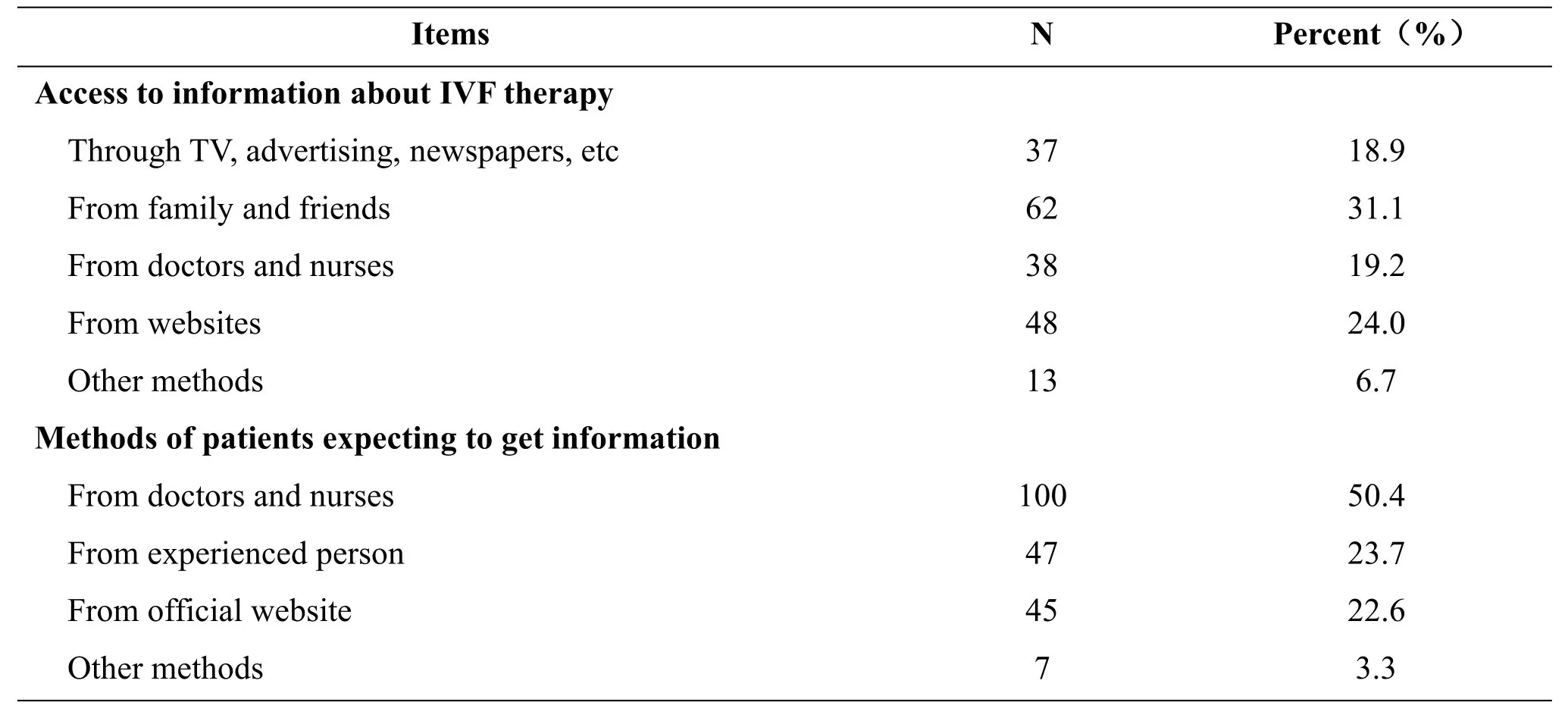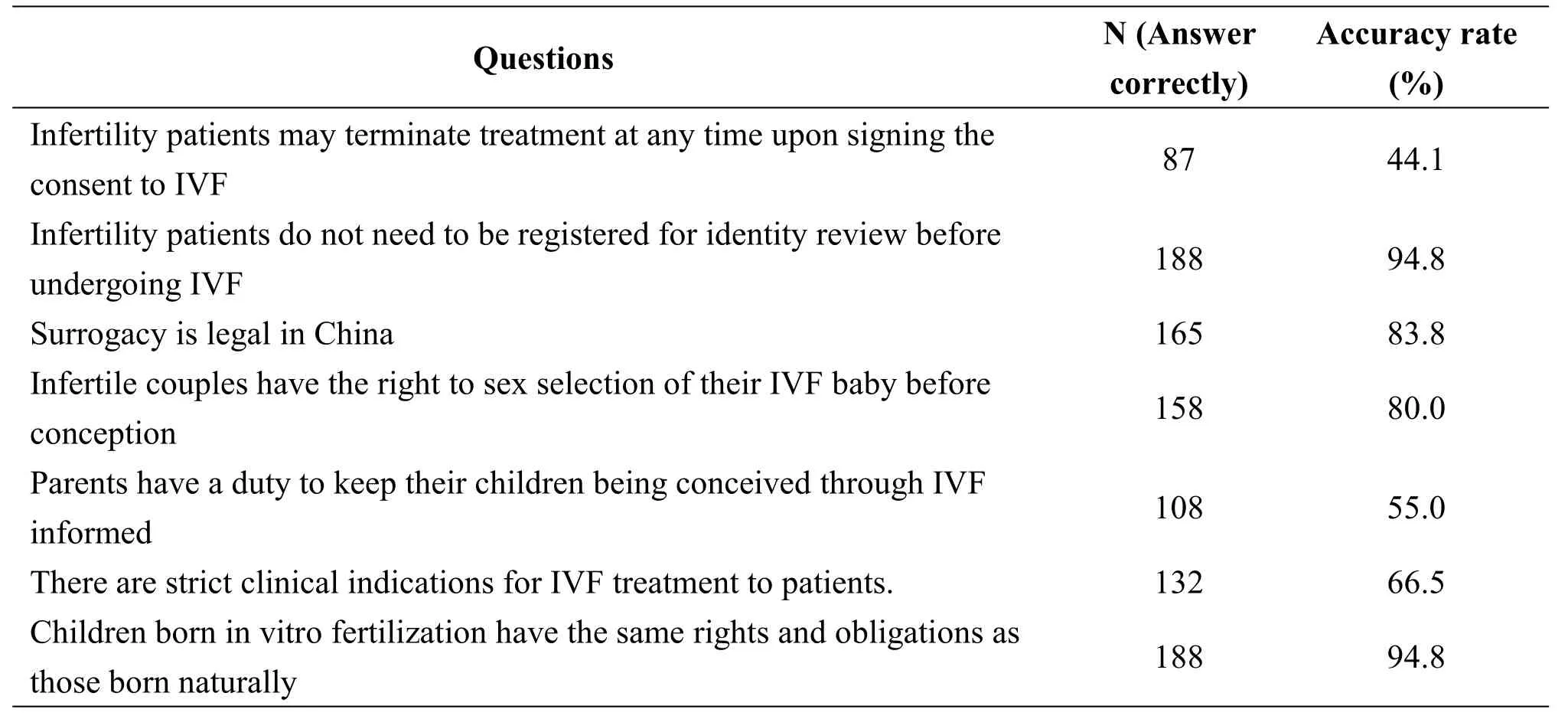Awareness and Attitudes Toward In Vitro Fertilization in Patients with Infertility:A Cross-Sectional Study
2021-03-29DongLiMei
Dong-Li Mei
1Nursing School,Peking University Health Science Center,Beijing,China.
Abstract
Keywords:Fertilization in vitro,Assisted reproductive technology,Psychology,Awareness and attitude,Infertility,Cross-sectional study
Background
Nowadays,because of environmental pollution,unhealthy lifestyles,drug use and abuse,delayed marriage,and the spread of sexually transmitted diseases,more and more people suffer from infertility,which is defined as a couple’s inability to conceive after 12 months of regular unprotected intercourse;fertility problems are caused by factors such as fallopian tube damage or blockage,impaired sperm production or function,ovulation disorders,uterine fibroids,and genetic disease [1,2].The global prevalence of infertility is approximately 10%-15%,and infertility,as one of the major diseases that threaten human health in the 21st century,affects about 12.5%-15% of couples in China[1].
As a highly advanced medical procedure,assisted reproductive technology(ART)helps infertile couples conceive and prevents genetic problems,and in vitro fertilization(IVF)has been scientifically developed and dramatically advanced since the first IVF human was born in the UK in 1978[3-5].The first test-tube baby conceived through IVF was born at Peking University Third Hospital in 1988,marking a huge step forward in global advances in medicine[6].Nowadays,in China,more and more patients with infertility have children with the help of ART following more than 30 years of its development[6].
In foreign countries,researches have indicated that people in less-developed areas,such as aboriginal Australia[7]and Nigeria[8],have poor awareness of IVF.It has been reported that older female patients with poor education or low income have radically misunderstood the ethics of IVF[5].Board et al.surveyed the public perception of infertility and treatment in six European countries,the USA,and Australia,finding that less than a quarter of the respondents knew about the success rate of ART[9].Moreover,research conducted by Bonetti et al.investigated the attitudes of ART professionals,including physicians and embryologists,toward the IVF decision-making process[10].As for domestic studies,Guo Y X et al.conducted a study on the awareness of freeze-all embryo transfer in patients that had received IVF embryo transfer[11].Additionally,YZ Deng’s research demonstrated that the awareness to IVF of patients with infertility needed improvement[12].However,a study on the awareness and attitudes of patients with infertility toward IVF has not been conducted in China.Therefore,this cross-sectional study was conducted in patients with infertility to popularize relevant IVF knowledge and improve patient satisfaction during treatment.
Methods
Materials
Using convenience sampling,a cross-sectional study was conducted by trained staff caring for patients with infertility at the Reproductive Medicine Center of Peking University Third Hospital from December 1 to 31,2020.The participants were recruited from outpatient and inpatient wards of Peking University Health Science Center.A semi-structured face-to-face interview was conducted with selected participants at random to represent all aspects of the questionnaire responses with good compliance.The interview outline is listed in Appendix 1.
Participants
The inclusion criteria were as follows:1)patients or spouses who had not been pregnant for 12 months of regular unprotected intercourse,2)age 20-55 years for female and 22-60 years for male,and 3)had participated in the informed consent interview and provided their informed consent.The exclusion criteria included the following:1)had ligation operation before,2)had an induced abortion three times or more,3)patients with severe mental disorders,and 4)patients with poor compliance.
Questionnaire
The survey was conducted using an anonymous self-designed questionnaire with a Cronbach’s α coefficient of 0.84 after a literature review,expert consultation,and focus group discussions.The questionnaire comprised four parts:(1)demographic characteristics of gender,age,marital and parental status,nationality,education level,work,and smoking history and drinking habits;(2)methods for obtaining information about IVF surgery,including patients’current access to information about IVF therapy and how they expected to get information;(3)patients’awareness of several aspects of IVF therapy,such as treatment expenses,total duration,factors affecting the therapy success rate,and their concerns about IVF therapy;and(4)12 questions about patients’awareness of the law and ethics of IVF.
Statistical analysis
Statistical analysis was conducted using the SPSS software version 24.0.Categorical variables were compared using the Chi-square test,while continuous variables were compared using the Mann-Whitney U test.Two-tailed P values<0.05 were considered statistically significant.
Ethics
The study was approved and certificated as exempt from examination by the Institutional Review Board of Peking University Health Science Center.All participants volunteered and had provided their informed consent prior to enrollment in the study.
Results
Demographic characteristics
A total of 205 questionnaires were returned,198 of which were valid after exclusions(see Figure 1).According to the survey results,60 males(30.2%)and 138 females(69.8%)enrolled in the study,with ages ranging from 22 to 50 years old(mean,32;median,31).The sex ratio may be related to the difference in infertility between the two sexes,as male risk factors account for 30%,female factors for 40%-50%,and common factors for 20%.The proportion of patients with undergraduate degrees was high,accounting for 57.8%,while the proportion of patients’income was relatively balanced.A large proportion was patients from other places and those attending their initial consultancy.Education levels and the availability of medical resources had a greater impact on patient’s decisions about receiving IVF treatment than economic circumstances.Other background information is presented in Table 1.

Table 1 Demographic characteristics

Figure 1:Flowchart of participants inclusion process
Methods for obtaining information about the IVF surgery
The effectiveness of information dissemination plays an important role in patient satisfaction with IVF treatment[13].As for the methods used to obtain information,31.1% of patients were more likely to have learned about the IVF surgery from family and friends,while 19.2% learned about the IVF surgery from doctors and nurses.The remaining percentage of participants obtained their information from TV,advertising,newspapers,websites,and so on,although the quality of information from the media was uneven.Approximately 50.4% of patients preferred to obtain information about ART from doctors and nurses,whereas some patients would choose to ask the experienced person or surf the official website.The methods for obtaining information about IVF therapy did not significantly differ between patients in terms of age,gender,education,income,residence,and treatment stage(P≥0.05),which may relate to the shortage in information resources and personal preferences to some extent.Research has shown that doctors and nurses did not have much time answering patients’questions in the face of a surge in the number of patients[14].Therefore,obtaining information through official channels,turning to the experienced person for help,and communicating with other patients became more and more significant[14].Other survey results are listed in Table 2.

Table 2 Methods to obtain information about IVF therapy
Awareness of IVF therapy


Table 3 Patients’awareness to IVF therapy

Table 4 Patients' awareness to law and ethics of IVF
Awareness of law and ethics
The enrolled patients had a good understanding of the common ethical and legal issues of IVF therapy,such as the identity review before receiving IVF,normal rights and obligations of children born through IVF,illegality of surrogacy,and lack of parents’right to sex selection when using IVF.However,they were less aware of whether IVF therapy could be terminated at any time,whether patients receiving IVF treatment should meet strict indications,and whether there was an obligation to keep the child informed.The data analysis indicated that patients’awareness of laws and ethics did not significantly differ in terms of age,gender,education,income,residence,and treatment stage(P≥0.05).
Interview
The interview demonstrated that the patient mainly obtained information about IVF from the Internet by herself and asked wardmates through the group chat.In addition,she sometimes turned to the attending doctor and paid less attention to the relevant laws though promised never to be illegal.Moreover,she advised that more knowledge about infertility and IVF should be popularized among the public(see Appendix 1).
Discussion

A new fertility policy called the Two-Child Policy,an adjustment of the One-Child Policy,was implemented in China in January 2016 to encourage couples to have a second child,hence contributing to older couples receiving IVF treatment.However,the duration and success rate of IVF therapy varies from person to person because IVF entails a complex series of steps consisting of ovarian reserve testing,semen analysis,retrieving mature eggs from ovaries,fertilizing with sperm,and transferring the embryo to a uterus,which all have the potential for failure[3].Sometimes,these steps are split into different parts,leading to a longer process.The chances of successful treatment also depend on the physical condition of the couple[3].For example,older patients tend to have poorer quality of eggs and lower viability of sperm[15].The fertilization of the ovum significantly decreases in patients over 35 years old[15].Moreover,overweight and obesity have a negative effect on the outcomes of IVF therapy by impairing ovarian responsiveness to gonadotrophin stimulation and increasing the risk of IVF cycle cancellation[16].It could even result in miscarriage,premature delivery,and the low birth weight of the baby when born.Additionally,mental stress and unhealthy emotions also increase the risk of pregnancy failure in couples undergoing IVF therapy[17].In addition,in contrast to western countries,the medical insurance costs of ART are entirely borne by patients in China,and as a consequence,economically disadvantaged couples may have no opportunity to receive IVF therapy[18].
As the results above demonstrate,the awareness and attitudes of patients with infertility toward IVF need improvement because patients with insufficient awareness of IVF would have high expectations and improper attitudes,such as shorter treatment times,higher success rates,lower treatment costs,and a lack of knowledge of the law and ethics.The discrepancy between the ideal and reality may increase the patient’s mental burden and decrease patient satisfaction during the therapy [19,20].Therefore,popularizing the correct knowledge and offering detailed information about IVF on the official website of Health Commission and Hospitals is necessary.Patients with successful cases or useful experiences could be invited to share their treatment stories on the official website,providing patients with a convenient and reliable platform for learning,communication,and encouragement.As the preparation for the therapy and the treatment procedures are complex and significant,there are lots of matters that the patients must attend to.The new media could be one of the methods of bridging the communication gap,where patients can consult on the treatment issues,while experts in related fields could be invited to answer questions from patients[21].Moreover,as the ethical and legal issues involved in IVF remain controversial,systematic training in the law and knowledge of ethics is of great importance to patients[22].
Therefore,firstly,the government should raise awareness about infertility and IVF [23].When patients with infertility seek medical advice for the first time,the medical staff should obtain their informed consent and help them,especially those with unrealistic expectations of the treatment,while preparing for the long therapy in the future[24].Patients undergoing therapy or suffering from treatment failure require psychological support and follow-up because patients with infertility are at significant risk of experiencing mental health problems[25,26].
Conclusion
Patients with infertility lack awareness and have improper attitudes toward IVF to some extent;therefore,relevant knowledge should be popularized and patient satisfaction during treatment should be improved.A large-scale and multicenter clinical study should be conducted to provide more detailed information and make more effective suggestions in the future.
杂志排行
Psychosomatic Medicine Resesrch的其它文章
- Contrast-induced Encephalopathy after Endovascular Embolization of an Anterior Communicating Artery Aneurysm:Case Report and Literature Review
- Diffusion of Innovative Behavior of the Public Toward Preparing FEMKs:From Innovative Characteristics to Personal Risk Perception and Behavioral Intention
- The Relationship Between Uncertainty in Illness,State Anxiety,and the Life Satisfaction of College Students During the COVID-19 Epidemic
